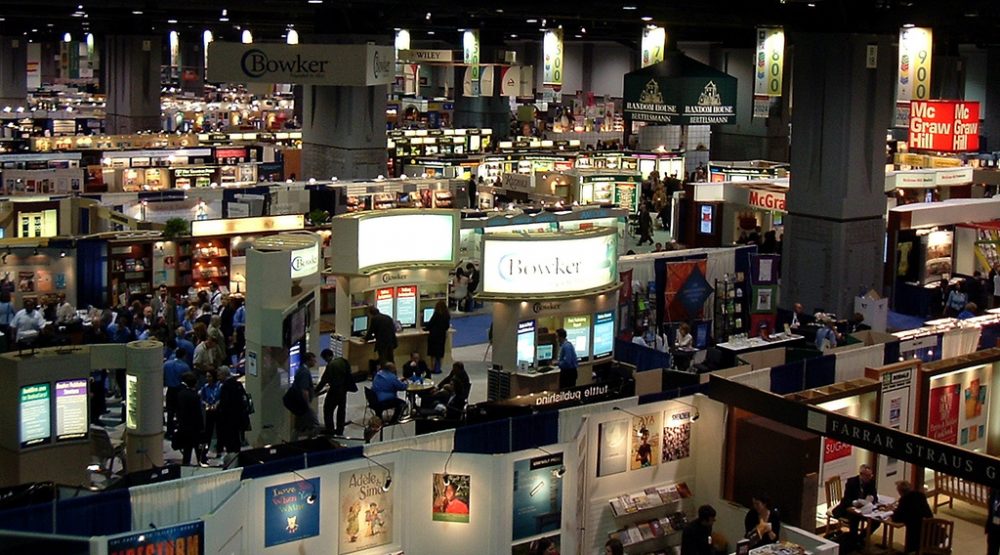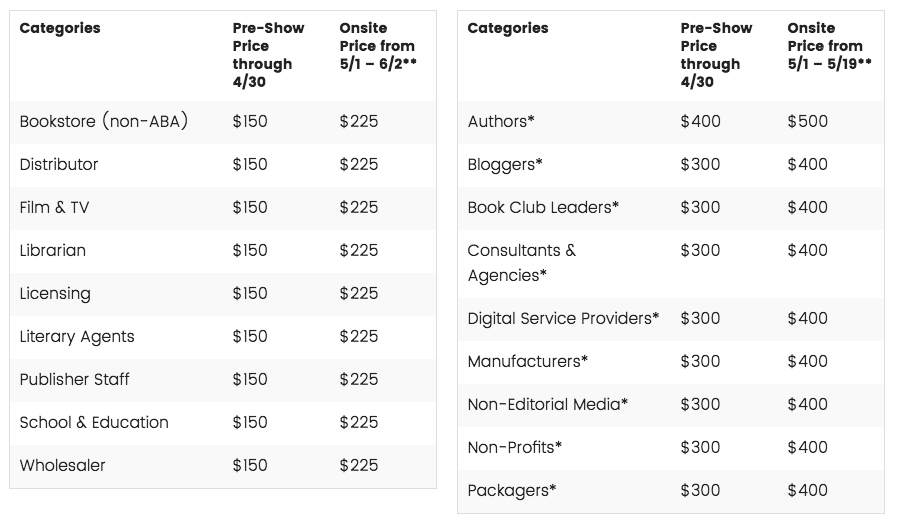
In 2012, I wrote the following post as a warning to self-published authors who fall prey to scams that take advantage of the highly recognized industry trade show, BookExpo (BEA), previously known as BookExpo America. I have updated this post since so much has changed in the last five years, both in regards to this particular trade show, as well as the publishing industry.
Important: In the past, BEA has taken steps to ban companies/organizations who resell BEA marketing opportunities at exorbitant prices. Still, while BEA attempts to educate and protect authors from making expensive mistakes, be smart and do your research before you make BEA part of your strategic marketing, publicity, and PR plan.
First, a little background: What is Book Expo (BEA)?
It’s the largest industry trade show in North America focused on traditional publishing. It started off as a convention for booksellers (the American Booksellers Association), and it’s attended mostly by people inside the industry, including literary agents, booksellers, librarians, and the media. The bulk of BEA consists of an exhibit floor where publishers purchase booth space to show off their upcoming titles (and authors), sell rights, and network with colleagues. There’s also a separate rights area where literary agents often have tables.
Do authors attend BEA?
Yes, but usually at the invitation of their publisher. Every year, traditional publishers decide what specific titles they want to push heavily at BEA, and will often invite the authors to do signings or events meant to bring visibility to the work pre-publication. Remember that “visibility” in this context means visibility to the trade (the industry), not visibility to consumers. There’s a separate event—BookCon—that focuses on consumers.
In 2014, in acknowledgment of the growing indie author market, BEA opened up an exhibit area where indie authors could buy affordable tables to conduct meetings and network. It was initially known as “Author Hub” and is now called “Author Market.” This is not an opportunity to sell books—selling books is not allowed at BEA. You can give away copies, though. Here’s the Author Hub sales sheet for 2016.
Should you exhibit at Author Market?
If you’re a professional, independent author with a significant history of sales, and already know of other professionals you could potentially meet and network with at BookExpo, then it may be a good opportunity for you. This is not a good opportunity for an author who has just published their first book, and thinks visibility at BEA might fix their marketing and promotion problems. It will not.
Whether or not you exhibit at Author Market, BEA is not a shortcut to getting up close and personal with traditional publishers or literary agents, in the hopes one of them will publish or represent your book. You’ll greatly annoy people if you go pitching on the floor, unless it has to do with subrights or licensing. If that is indeed your goal, you should have a very polished pitch, and demonstrate a successful track record. Best-case scenario: set up meetings in advance and don’t ambush people.
BEA is generally not interested in unaffiliated authors walking its floor, because every editor/agent hides from the author who is pitching their self-published work. You can see the unwelcome mat reflected in these 2017 registration prices (highest for authors!); authors must also be “approved” for a badge.

Avoid paying to have your book promoted for you at BEA
Aside from the Author Market, there are a handful of opportunities for authors to get visibility for their work at BEA. As far as I’m concerned—as someone who attended this show for 10 years, mainly as an editor with a traditional publishing house—it is not worth the investment. Here’s why.
- The emphasis of the show is on traditional publishing, rights sales and pre-publication marketing, and does not favor indie title promotion. It is a New York industry event where traditional publishing insiders talk to other traditional publishing insiders. Yes, there are librarians and booksellers, but they’re rarely paying attention to the places where an indie book may be showcased or promoted.
- Nobody is going to notice your book there. Your book is likely to be promoted with many other books, with no way of attracting attention even if someone did pause for a second within 50 feet of your book. Imagine setting a copy of your book down in the world’s largest book fair, and expecting someone to not only notice it, but be entranced by it so much they can ignore 10,000 other things happening at the same time.
- If you—the author—are not present to advocate for it, your book doesn’t stand a chance. Services that offer to promote your book at BEA are rarely, if ever, hand-selling or promoting your book in a meaningful way. But they will be happy to cash your check and say that your book had a “presence” at BEA. If you want to satisfy your ego, go ahead. But it’s not going to lead to meaningful sales. (I challenge anyone in the comments to provide evidence that a self-published book gained traction at BEA because the author paid a fee to secure placement—and the author was not present.)
BEA is a quality industry event, and it is a legitimate marketing and promotion opportunity. But for the majority of indie authors, it does not make sense to invest what are likely your limited resources in BEA.
For more insight and advice
- Read Orna Ross at ALLi on what book fairs (may) offer indie authors
- Indie author David Gaughran has long warned against book fairs

Jane Friedman has spent nearly 25 years working in the book publishing industry, with a focus on author education and trend reporting. She is the editor of The Hot Sheet, the essential publishing industry newsletter for authors, and was named Publishing Commentator of the Year by Digital Book World in 2023. Her latest book is The Business of Being a Writer (University of Chicago Press), which received a starred review from Library Journal. In addition to serving on grant panels for the National Endowment for the Arts and the Creative Work Fund, she works with organizations such as The Authors Guild to bring transparency to the business of publishing.

You’ve read my post incorrectly. I’m telling people not to pay to have their book promoted at BEA by a third party. Big difference.
Furthermore, authors are not meant to attend BEA unless it’s at the invitation of their publisher.
What about Kirkus marketing services? I’m hesitant about self-publishing, being good at promoting others if I put my mind to it, but hopeless at doing for my own work. Someone sent me a link to Kirkus services today, it sounds expensive.
Are you interested in Kirkus online advertising packages? If so, I wouldn’t advise buying into it unless you really understand online advertising, i.e., you know what CTR means, you know the importance of conversions, you have experience writing online copy that produces conversions. Online ads can be next to useless unless (1) you’re targeting the right audience (2) you know what to tell the audience to make them buy after they click.
Pass. I think you’re saving people a lot of trouble 🙂
Totally agree with this and I applaud you for stating it so boldly. SO proud to know you.
Hi Jane – I agree with you in general, but there are two instances that I do think have value – 1) if you have a distributor, displaying in their booth and supplying the reps with a sell sheet about your book, and 2) the IBPA booth gets a lot of traffic, provides a nice catalog for librarians and book sellers to take, every book is categorized and face out and the booth is manned by knowledgeable people. Their Ben Franklin award winners are displayed separately and get a lot of attention.
I agree. If you have a well-known distributor in the business, maybe. If you’re an award winner, maybe. I still think the value is very limited, so I wouldn’t steal funds from other marketing and promotion efforts in order to do it.
Thanks – keep the advice coming.
[…] Authors: Don’t Pay Money for BEA Book Promotion, by Jane Friedman – “This advice is for self-published authors, independent authors, […]
It is amazing to me that anyone would think for a moment that paying your way into an event like this is a wise decision. The folks selling these sorts of “services” have no interest at all in the success of a book or its author; their only objective is selling the “spot”. Once that is accomplished everything else is less than secondary.
The same sort of money extraction scheme shows up with each issue of the New York Review of Books. Huge, two page advertisements dotted with a couple dozen vanity published books. If the company responsible for putting these ads together had any real interest in selling the books featured they would surely give at least a cursory glance and editorial once over to the “ad copy” next to each book cover image and ISBN code. But once they have extracted the rather sizable sum of money from the unfortunate hopefuls what is the point of actually helping them sell a book or two? That’s not part of their business plan.
Hear, hear.
[…] professor Jane Friedman, who hosts the Ether here at her site, posted her excellent warning, Authors: Don’t Pay Money for BEA Book Promotion, just as I’d been reading an arresting series of comments on a blog post titled Who Controls […]
On a related note, what do you think of people offering a paid service for writers to pitch book ideas at the BEA? These are not agents. Agents do this for free. I know a few people who go every year and get paid big bucks for this service. Agents don’t appreciate them much. I advise my clients to just find an agent.
I haven’t heard of such services, so it’s tough to comment. I’d probably avoid.
Thank you so much for this information as I was just about to do so; I did, however, wonder about exposure for my book while not able to be there in person. You are a life/money saver. I wish there were more like you. My book, When Pigs Fly; A Journey Home, will have to fly to new heights on its own…thank you, thank you.
susanfries-author.com